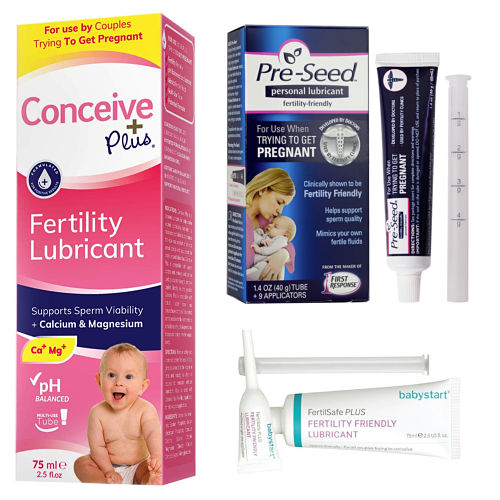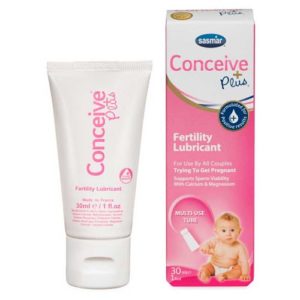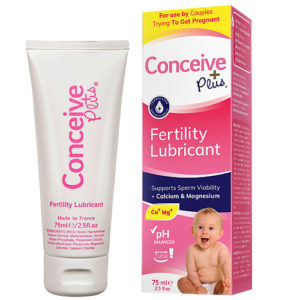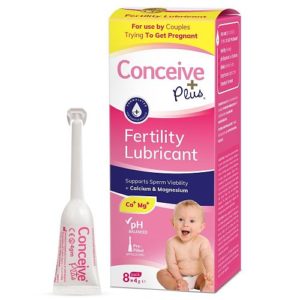Our Guide To Fertility-Friendly Lubricants For Couples Trying To Conceive
If you’re trying to conceive, you’ve probably been online and Googled “What not to do when trying to get pregnant”, “5 easy ways to get pregnant quicker”, or similar phrases; constantly searching for that magic tip that will help you conceive. This can be an incredibly stressful period in your life and can have a tremendous emotional impact on how you go about your day-to-day life.
In fact, if you Google TTC (Trying to Conceive) you’ll discover that there are entire communities out there, filled with couples or single women who are trying to conceive. Many women with infertility issues feel totally isolated, as if all their family and friends are raising children, while they’re left alone, struggling to conceive. And that’s why these support groups exist: they provide support and helpful tips for women who are trying to get pregnant.
There’s certainly plenty of online advice for women trying to conceive, like just how crucial timing is. Most women trying to conceive understand that their best chance of getting pregnant is midcycle. This is approximately 14 days prior to their next period. Unfortunately, there’s a lot more to pregnancy than just timing. If only it were that easy! Women must consider their age, their health in general, and even the personal lubricant they use when having sex. Did you know that using the wrong personal lubricant can prevent, or certainly hinder, fertilisation and pregnancy? Fortunately, when you use right personal lubricant, and by that we mean a sperm-friendly lubricant, your chances of becoming pregnant are greatly enhanced.
How Personal Lubricants Affect Sperm
A recent research study carried out by the Journal of Sexual Medicine discovered that around 66% of women in the United States use a personal lubricant when having sex, and some women use it on a regular basis. These figures alone suggest that it’s vitally important that women trying to conceive understand just how lubricants can negatively affect sperm. In order to understand why this is so important, let’s first discuss how an egg becomes fertilised.
Within a woman’s fallopian tube, one single egg remains for around 24 hours, waiting for sperm to fertilize that egg. After ejaculation occurs within the woman’s vagina, the sperm must reach that egg, making its way through the cervical opening and uterus. Only the strongest and best sperm reach the Fallopian tube. If fertilisation occurs, the egg changes in order to avoid contact with any other sperm. This means that, if you’re trying to conceive, you need to do everything you can to ensure that single sperm’s journey through the vagina and uterus is as easy as possible to allow the egg to be fertilised in the Fallopian tube.
Making the Connection between Infertility and Personal Lubricants
Today, fortunately, medical practitioners have more understanding on why it can be difficult for a sperm to penetrate an egg. They’ve finally made the connection between infertility and personal lubricants, which are typically recommended for many couples to ensure that sex is more comfortable.
pH of Personal Lubricants
Because the human body is so amazing, women’s bodies have been designed to assist sperm reach their destination. This means that the pH balance of a woman’s cervical mucus and uterus is welcoming to sperm as they travel towards the egg. However, the problem arises with personal lubricants, because the pH of most of these lubricants is not sperm-friendly. Personal lubricants have been designed specifically to make having sex easier and more comfortable, but unfortunately the acidity in these lubricants can be enough to damage or kill sperm.
Even if a woman has no other fertility issues, using the wrong personal lubricant can make it difficult for her to become pregnant. Her partner may have sperm with low motility, or he may have a low sperm count, so when couples use acidic lubricants it’s making it very difficult for that one single sperm to succeed in its journey. When personal lubricants are involved, most sperm will simply drop to the uterus and eventually disintegrate.
Thickness of Lubricants
Your personal lubricant of choice may not be acidic; however the thickness of the lubricant could be the reason the sperm is struggling to reach its destination.
Water in Lubricants
Many personal lubricants are thinner because they contain more water. This in itself can be problematic because if this sperm absorbs the water it will become damaged.
What the Clinical Studies Show
Two well-known clinical studies on lubricants and sperm motility have been carried out, analyzing the effects lubricants have on sperm. These are:
No. 1: Journal of Fertility and Sterility
In this study, the effects of natural oils and synthetic lubricants on the motility of sperm were analyzed. The conclusion was that both synthetic coital lubricants and sesame oil damaged the motility of sperm. The study also concluded that sperm-friendly personal lubricants like Pre-Seed and baby oils had no damaging effects, making them sperm-friendly personal lubricants
No. 2: The Journal of Assisted Reproduction and Genetics
This study was carried out in an in-vitro setting, analyzing the effects of personal lubricants on the motility and vitality of sperm, and its DNA structure. The conclusion from this study was that personal lubricants can in fact have negative effects on sperm. The study also concluded that fertility-friendly lubricants Conceive Plus and Pre-Seed have no negative effects on the function of sperm.
Does That Mean That Natural Lubricants Are Better?
These study results may suggest to you that, because you and your partner are using an organic, natural, personal lubricant, these results don’t affect you. The truth is that even natural lubrications can be damaging to sperm when you’re trying to get pregnant; did you know that even spit is too acidic when you’re trying to conceive?
Obviously, the best solution would be to spend more time with foreplay and completely negate any need for a personal lubricant. This scenario would be presenting sperm with a sperm-friendly environment; but most couples will agree that this is not always possible.
Is There a Natural Lubricant I Can Use When Trying to Conceive?
If you’re not ready to purchase an ideal sperm-friendly lubricant, like Pre-Seed or Conceive Plus, there are other natural personal lubricants you can try –
- Baby oil and canola oil are sperm-friendly oils; however, if you’re subject to vaginal infections you need to avoid these two.
- Plain yoghurt typically does not interfere with sperm motility or a woman’s pH balance. Some women use plain yoghurt to treat vaginal infections.
- It’s thought that Coconut oil has little effect on sperm, and this oil is often recommended as natural lubricant.
- You may want to consider using egg whites as a lubricant, which have a consistency similar to cervical mucus. Keep in mind, though, that you might be risking salmonella poisoning (maybe not worth the risk?)
There’s not really a lot of information available about the above alternatives and their successful use as sperm-friendly personal lubricants. It could be that baby oil would be a better choice than some personal lubricants that are advertised as sperm-friendly.
The Best Fertility Friendly Lubricants Available Today
As mentioned above, we highly recommend Conceive Plus and Pre-Seed as the best sperm-friendly personal lubricants on the market today. (Further reading: You may be interested in our article on how fertility lubricants work and which ones are safe)
SASMAR ‘Conceive Plus’ Fertility-Friendly Lubricant
Conceive Plus is a pH balanced formula that also contains calcium and magnesium irons; both of which are believed to assist in the fertilisation process. Studies on Conceive Plus show that sperm treated with this lubricant had a 70% vitality rate. A little more budget-friendly than Pre-Seed, Conceive Plus fared very well in research studies. All ingredients contained in Conceive Plus have been approved by the FDA for conception.
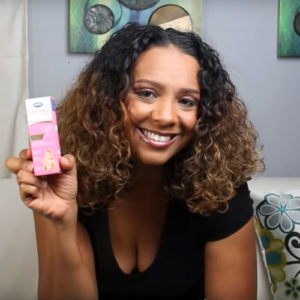
Conceive Plus can be purchased in small tubes or in prefilled applicators. The latter make it much easier and less messy to apply directly to the cervix. We note that the Conceive Plus website suggests optimal results will be achieved by using the applicator 10 minutes prior to having sex, while simultaneously using the lubricant from the tube. Generally, Conceive Plus reviews from customers are positive.
Conceive Plus is generally cheaper online at Zoom Baby than it is in the shops. If you are desperate you can buy Conceive Plus in Boots but it will work out more expensive. We have also produced a guide on how to use Conceive Plus.
Conceive Plus – Packaging And Sizes
Conceive Plus has a distinctive pink and yellow packaging. The product is available in four variations. A 30ml and 75ml tube can be purchased. The product also comes in packs containing pre-filled, 4 gramme dose of the lubricant. These packs contain either 3 or 8 of the pre-filled applicators.
– 30ml tube
– 75ml tube
– 3 x 4g Pre-Filled Applicators
– 8 x 4g Pre-Filled Applicators
‘Pre-Seed’ Fertility-Friendly Lubricant
Many couple choose to boost conception chances by using Pre-Seed.
Pre-Seed arrived on the scene before Conceive Plus. In fact, there has been much argument over the years at to which is better, Pre-Seed or Conceive Plus? Despite being the oldest lubricant on the market, Pre-Seed Reviews in 2020 are still positive and the product has many fans,
Pre-Seed Fertility-Friendly Lubricant has fared well in many studies too. Studies show that Pre-Seed has the lowest negative effect on how sperm travel. This results in the least amount of damage to the DNA of sperm.
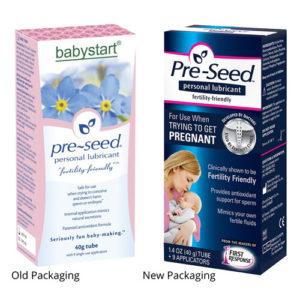 Another bonus of using Pre-Seed Fertility-Friendly Lubricant is that it’s recommended by fertility clinics for couples trying to conceive, so we know it works. In our opinion, if you’re trying to conceive and you’re using a personal lubricant, you should try Pre-Seed.
Another bonus of using Pre-Seed Fertility-Friendly Lubricant is that it’s recommended by fertility clinics for couples trying to conceive, so we know it works. In our opinion, if you’re trying to conceive and you’re using a personal lubricant, you should try Pre-Seed.
How Do You Use Pre-Seed Personal Lubricant?
In contrast to traditional personal lubricants, Pre-Seed comes complete with applicators to ensure that exactly the right amount of lubricant is used; it’s also less messy. In addition, the applicator can be used to lodge some lubricant near the cervix, thus assisting the sperm in its journey to reach the egg. If in doubt, you should always read our guide on how to use Pre-Seed.
We know that some people have experienced adverse reactions to glycerine. Please be assured that there is no glycerine contained in Pre-Seed Fertility Friendly Lubricant, simply because glycerine is known to be harmful to sperm.
Pre-Seed is generally cheaper when bought online at Zoom Baby. Once again though, if you are desperate, you can buy it at pharmacies such as Boots or Superdrug but it will be more expensive than when bought here. Customers outside of the UK might find it easier to buy online as Pre-Seed can be harder to buy in the shops in countries such as Germany.
In Conclusion
If you’re currently trying to conceive and you’re using a personal lubricant, please check to ensure that the one you’re using is a sperm (or fertility) friendly lubricant. Be aware that you may be using the wrong type of lubricant which could be damaging or killing sperm. If lubricant is not exactly your thing, you may want to consider changing your mind and try using either Pre-Seed or Conceive Plus fertility-friendly lubricants because it may be exactly what you need. It’s true that not a lot of research has been carried out on sperm-friendly lubricants, but in every study we have sighted, Pre-Seed comes out on top.
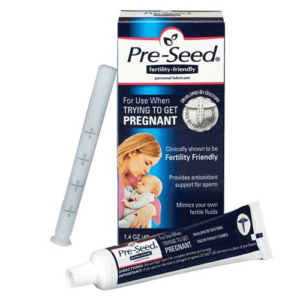
Pre-Seed Fertility Lubricant
Original price was: £21.99.£18.95Current price is: £18.95.
Add to basket

